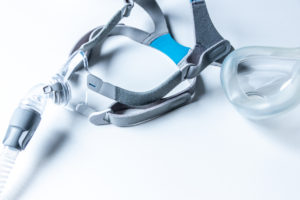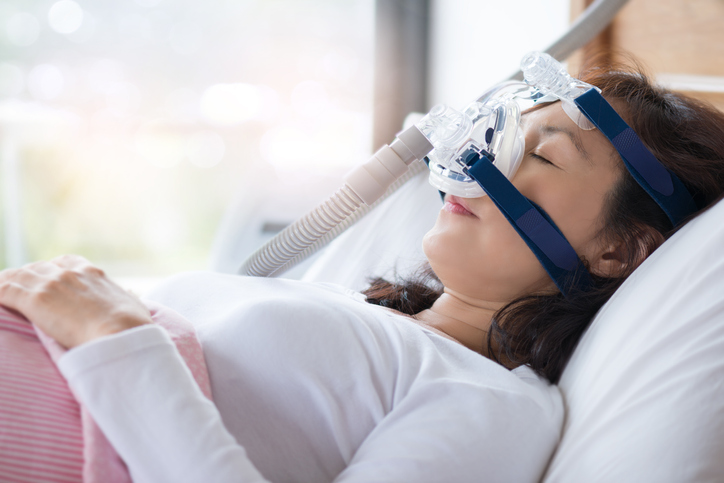Sleep apnea can be a potentially dangerous disorder in which unstable breathing patterns can cause breathing to start and stop while you’re asleep. Older people and obese people have a higher risk of developing sleep apnea. Some symptoms of sleep apnea include excessively loud snoring and waking up feeling tired, even after a full night’s sleep. There are options for treatment for sleep apnea, including a breathing assistance device to be used in the night known as a CPAP machine. If you are experiencing symptoms of sleep apnea, the first step is to visit a doctor for examination. Dr. Madison Richardson is a skilled and experienced otolaryngologist located in Beverly Hills offering sleep apnea treatment. If you need help with a better night’s sleep, and safer more stable breathing, contact a doctor for sleep apnea. Schedule your appointment with Dr. Madison Richardson today.

Overview
Sleep apnea can be a dangerous sleep disorder that affects your breathing patterns are uneven, starting and stopping unexpectedly. There is a possibility that if you snore loudly, and are waking up tired after a full night’s sleep, you might have sleep apnea.
There are 3 main variants of sleep apnea:
- Obstructive sleep apnea, is the number one form of sleep apnea, occurring from relaxed throat muscles during sleeping.
- Central sleep apnea, this is when the brain is not signaling to your muscles to properly maintain breathing.
- Complex sleep apnea syndrome, is a combination of both forms of sleep apnea.
If these symptoms sound familiar, and you suspect you have sleep apnea, contact Dr. Richardson to schedule your appointment as soon as possible. Treatment for sleep apnea could prevent other serious complications including heart damage.
Symptoms of sleep apnea
The symptoms of central and obstructive sleep apnea can often occur at the same time and be very similar, making a proper diagnosis difficult, but important. The most common signs to look for include:
- another person reporting that you stopped breathing while asleep
- Waking up with a dry mouth
- Snoring loudly
- Headache in the morning
- Gasping for air while asleep
- General irritability
- Insomnia
- Difficulty paying attention while awake
- Being very sleepy during the day
When to contact Dr. Richardson
Snoring loudly could indicate a possibly serious medical issue, but not every person that has a sleep apnea diagnosis snores. If you notice sleep apnea symptoms, do not hesitate to tell Dr. Richardson, especially if you are feeling irritable, fatigued, and sleepy during the day. This mainly happens when the throat muscles relax, closing or narrowing the air pathway while you breathe in. You cannot get enough air while sleeping, which lowers the oxygen levels in the blood. When this happens, your brain becomes aware and wakes you in an attempt to reopen the airway. This waking is so quick that you are not aware, and won’t remember it the next morning.
When this happens, you may choke, gasp, or snort. It is a pattern that may repeat itself up to 30 times every hour throughout the night, meaning that you almost never reach the deepest, most restful phase of sleep.
Risk factors for sleep apnea
Everyone is at risk for sleep apnea, including children, but there are certain things that can increase this risk, such as:
- Excess weight. Being overweight can raise the risk of sleep apnea, due to fat deposits in the top of the airway constricting breathing.
- Neck circumference. People who have a wide neck circumference will most likely have a narrower airway
- Being male. People assigned male at birth are twice or three times more likely are more likely to develop sleep apnea. Women who are overweight also develop the risk after menopause.
- Being older. Sleep apnea is more likely to occur in older adults.
- Family history. A family medical history of sleep apnea will increase your odds of a diagnosis.
- Use of alcohol, sedatives or tranquilizers. Substance use can cause the muscles in your throat which can cause sleep apnea.
- Smoking. Individuals who smoke are 3 times more likely to develop sleep apnea than nonsmokers. Smoking will increase your fluid retention and inflammation of your upper airway.
- Nasal congestion. Having difficulty breathing through your nose means that it is more likely that you will develop sleep apnea.
- Medical conditions. Certain conditions such as high blood pressure, Parkinson’s disease, congestive heart failure, and type 2 diabetes can increase your risk as well. Be sure to let Dr. Madison Richardson know about your medical history.

book an appointment

